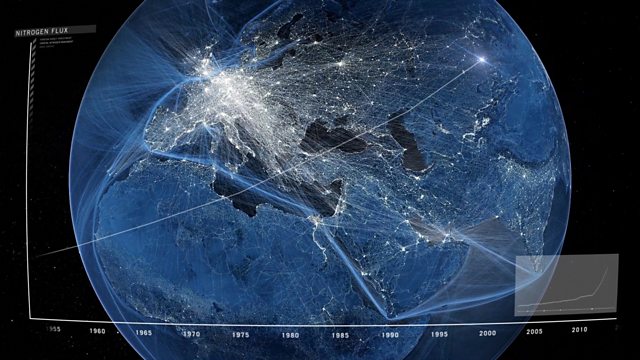The Age We Made - Part 2
Humanity’s impact on the atmosphere with fossil fuel burning is so profound that we’re creating a new geological time period, say geologists. They’ve named it, the Anthropocene.
Humanity’s impact on the atmosphere with fossil fuel burning is so profound that we’re creating a new geological time period, say geologists. They’ve named it, the Anthropocene.
In this part of her journey into the Anthropocene, Gaia Vince explores how fossil fuel burning will leave enduring marks in geological record forming on the Earth in current times.
Climate change and ocean acidification are in the process of transforming the planet on such a scale that humanity has shifted Earth history into a new geological epoch. Millions of years from now, scientists will be able to read the rocks forming now and see that something profound and unprecedently rapid – from sea level rise to dissolving coral reefs.
Drawing from similar episodes in Earth history, leading geoscientists warn of a global blanket of oxygen-starved muds, extinctions of much marine life and a sea level 20 metres higher than today’s.
Last on
More episodes
Previous
Geologist Jan Zalasiewicz

Geologist Jan Zalasiewicz points to the start of a 180 million year old global warming event, as it’s written in the Jurassic age rocks in Leicestershire, England. What geological signatures will our fossil fuel burning leave behind?
Credit: Andrew Luck Baker
Broadcasts
- Mon 29 Oct 2012 19:32GMT91�ȱ� World Service Online
- Tue 30 Oct 2012 00:32GMT91�ȱ� World Service Online
- Tue 30 Oct 2012 04:32GMT91�ȱ� World Service Online
- Tue 30 Oct 2012 11:32GMT91�ȱ� World Service Online
- Sun 4 Nov 2012 01:32GMT91�ȱ� World Service Online
- Sun 4 Nov 2012 06:32GMT91�ȱ� World Service Online
Space
The eclipses, spacecraft and astronauts changing our view of the Universe
The Curious Cases of Rutherford and Fry
Podcast
-
![]()
Discovery
Explorations in the world of science.



